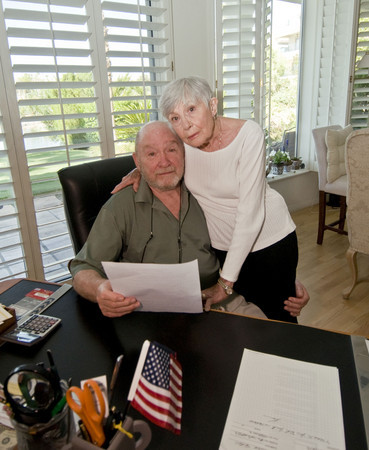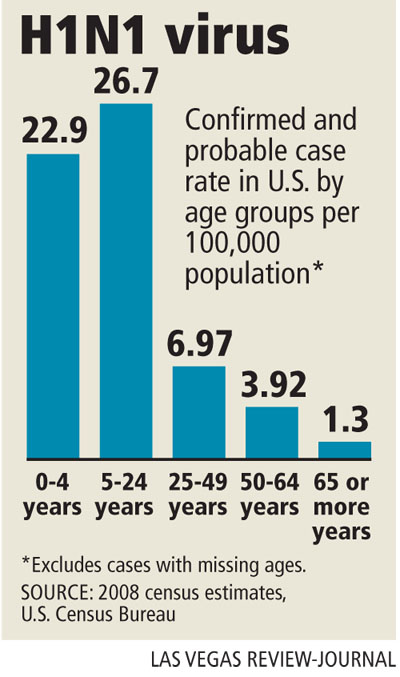Some dispute priorities set for flu shots
Ken Sokol can't believe his 78-year-old wife, Mary Ann, a lung cancer and heart attack survivor, will not be able to get an H1N1 flu shot when the vaccinations are first offered this fall.
Sokol, an 80-year-old retired businessman, stares at a document from the Nevada State Health Division that lists the priority groups that should receive the swine flu vaccine.
Not only are people older than 65 not included, he notes with a shake of his head, neither are those older than 65 with serious medical conditions.
"I simply can not believe my country would do this," Sokol said, his arm around his wife of 56 years as they sat on the living room couch in their Canyon Gate home. "Why would you keep it from a senior not strong enough to fight off the flu?"
Though public health officials expect that an H1N1 vaccine will be ready for distribution in mid-October, they think there won't be enough for all Americans.
And that has meant, according to Dr. Anthony Fiore with the federal Centers for Disease Control and Prevention, that the government had to study the nearly 44,000 cases of the virus reported to the CDC since the outbreak began in April and prioritize who would first get the vaccine.
The evidence shows, he said, that as a group seniors need the vaccine less than younger age groups.
"It appears that older people have a pre-existing immunity to the H1N1 virus," he said.
Americans up to 24 years of age, CDC statistics reveal, are about 20 times more likely to contract the virus than people older than 65.
People ranging in age from 25 to 49 are five times more likely to be burdened by the virus than seniors. And men and women in the 50 to 64 age bracket have a three times greater chance of catching the virus than those older than 65.
"We're not saying they (seniors) shouldn't be vaccinated," Fiore said. "But despite our best efforts and a huge effort by the federal government, we won't have enough of the vaccine in the early going, and we had to make some tough decisions about who gets it first."
CDC researchers have suggested that the immunity older adults appear to enjoy was built up either because they either were infected with or vaccinated against an older seasonal flu strain that closely resembled H1N1.
Sokol is aware of the statistics. But he says he is also aware many seniors, including his wife, have underlying medical conditions that have rendered their immune systems defenseless. He noted that the first person to die in Las Vegas from the swine flu was a 70-year-old tourist from the East Coast. She had an underlying medical condition that made it difficult for her to fight off the virus, public health officials said.
"Even though I'm 80 years old, I guess I'm OK with not getting vaccinated because I'm pretty strong," he said. "I've got diabetes, but I've got it under control with pills. But that's not the case with my wife and so many other seniors. If they get the H1NI flu or any flu, they're in real trouble. I think the system should make exceptions for them -- people whose doctors say they need the shot -- and allow them to get vaccinated."
But Brian Labus, senior epidemiologist for the Southern Nevada Health District, said Wednesday that exceptions would slow down a process that is trying to catch up with an outbreak that might well start mushrooming soon.
"We have to get the vaccine out to people as fast as we can," he said, adding that by vaccinating the young, seniors will be protected because there will be fewer people from which to catch the virus.
Fiore said he understands the concern of the frail and their loved ones.
"Those people have to work out a kind of disaster plan with their doctors," he said.
They cannot, he said, let flu symptoms pass "for any length of time" because anti-viral medications such as Tamiflu are only helpful in fighting the virus when taken in the first 48 hours.
Mary Ann Sokol said her doctor already has given her Tamiflu to keep at home.
"He understands I'm at risk," she said.
Fiore said it is important that seniors continue to get vaccinated for the seasonal flu.
"They're still the most susceptible there," he said.
Federal, state and local public health officials are united in their agreement with the way the nation is prioritizing who gets the H1N1 vaccine.
"This is about populations most at risk," said Dr. Tracey Green, Nevada's state health officer. "We're going about this scientifically."
Dr. Ivan Goldsmith, a Las Vegas physician who specializes in internal medicine, sees it differently.
"This is absolutely terrible," he said. "How can you discriminate against one age group this way? In the end, if this flu hits, we'll see that seniors suffered a lot."
Though the infection rate for people 65 and older is 1.3 cases per 100,000 people, their hospitalization rate jumps to 1.7 cases per 100,000 people -- a slightly higher hospitalization rate than either the 25 to 49 or 50 to 64 age groups.
"This is not surprising," a CDC report said, "given that people 65 and older are generally considered at higher risk of serious flu-related complications including those requiring hospitalization, from seasonal flu illness."
Children up to 4 years of age had the highest hospitalization rate at 4.5 cases per 100,000 people, while young people in the 5 to 24 age bracket had a hospitalization rate of 2.1 cases per 100,000.
When CDC studied the records of 268 patients hospitalized with H1N1 early in the outbreak, the number of deaths was highest among people 25 to 49, 39 percent; followed by those 50 to 64, 25 percent; and people 5 to 24 years of age, 16 percent. Those older than 65 were at 9 percent, and children up to 4 years old were at 2 percent.
This is a very different pattern from what is seen in seasonal influenza, CDC officials point out: An estimated 90 percent of influenza-related deaths occur in people 65 and older.
Deborah Jaquith, director of communications for the AARP in Nevada, said the national advocacy group supports how public health officials have decided to vaccinate people.
"They're making their decisions on the best evidence they have," she said.
Green said that once the vaccinations are given to the priority groups, then people such as Mary Ann Sokol would be next in line for receiving the vaccine. But no health officials could speculate on when that might happen.
Ken Sokol, however, said there should be exceptions to the rule when its warranted.
"When people are really at risk because of their health, we should recognize that and help them. That's the country I believed I lived in," he said.
Contact reporter Paul Harasim at pharasim@reviewjournal.com or 702-387-2908.


















